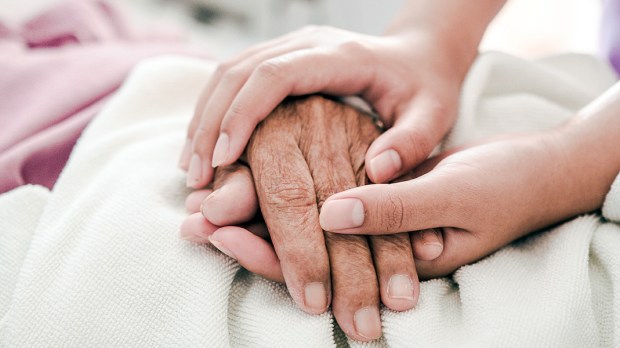As one’s life comes to a close — whether it be it from the toll taken by time, a long standing illness, or trauma — often one of the only comforts left is to be surrounded by family and friends. Unfortunately there are many instances in which people shuffle off this mortal coil in a small, dimly lit hospital room, with no company at all. This increasingly common situation has inspired a new hospital program called “No One Dies Alone.”
In 2001, an Oregon nurse named Sandra Clarke started her shift on a normal day, and as she was tending to her first patient, the old man asked if she would sit with him for a while. Sandra was as swamped with work as nurses usually are, but promised to return when she’d finished her rounds. When she came back to the old man, however, he had already passed on. Clarke was inspired to make sure that this would never happen again, and thus the “No One Dies Alone” movement began.
At Georgetown University Hospital, the program was introduced by Beth Orrell, a palliative care nurse, and her coworker, Dr. Robin Gross. She told the Arlington Catholic Herald, “Georgetown as an institution really values the dignity of every human life. In my work I’m able to uphold that value and it gives me great satisfaction.”
Together, Orrell and Gross made the rounds to all the different churches in their community and assembled a group of 15 volunteers who were trained to handle both the physical process of death and the spiritual aspects. The group learned to sense how to be most helpful to their patients. Some will play music or hold a hand, while others will read poetry or from sacred texts. All of them provide much needed companionship in the patient’s most desperate hours.
The Arlington Catholic Herald spoke with volunteer Maryel Rodgers, a parishioner of Our Lady, Queen of Peace Church in Arlington, who was one of the first Ignatian volunteers. She described her encounter with a dying woman named Grace:
The woman lay still “under a purple fleece blanket sprinkled with brightly colored hearts and edged with broad fringes,” recalled Rodgers. “Her graying hair spilled across the pillow. Her breath was firm and steady. She seemed to be unaware of the commotion of the busy hospital unit.” From a poster on the door, Rodgers learned that Grace enjoyed dancing and oldies music. She had a husband and daughter. Grace looked about Rodgers’ own age, and she softly began to speak to the woman about what they might have had in common. Eventually, she had to leave. “How do I say goodbye? I am looking at you, robed in that soft blanket of royal purple and I think of the woman in the Gospel story who was eager to touch the fringes of Jesus’ garment,” Rodgers wrote in her journal, which was later published in an Ignatian Volunteer Corps newsletter. “Let me now touch the fringes of your garment as you move into eternity. Thank you for your company.”
These works of mercy can take an emotional toll on those who volunteer, and there is a regular support group that meets to help them process the deaths they are present for. Orrell said, “I think all of them have learned about themselves and who they are, and I think being able to give a deep human connection is a very satisfying thing.”
The majority of the patients No One Dies Alone serves are not alert or conscious. Many of them are hooked up to life-support machines, or weakened by a long draining illness. Orrell believes that the presence of these volunteers can restore a bit of the humanity which becomes obscured by the dying process.
“The volunteers give back to the staff in addition to the patients. They bring a fresh perspective in terms of us ensuring the patients’ comfort,” she said. “They remind us of the patients’ humanity. It’s always a good thing. “I just think that human presence is so important at the end of someone’s life,” she said. “People are not alone when they’re born and they should not be alone when they die.”

